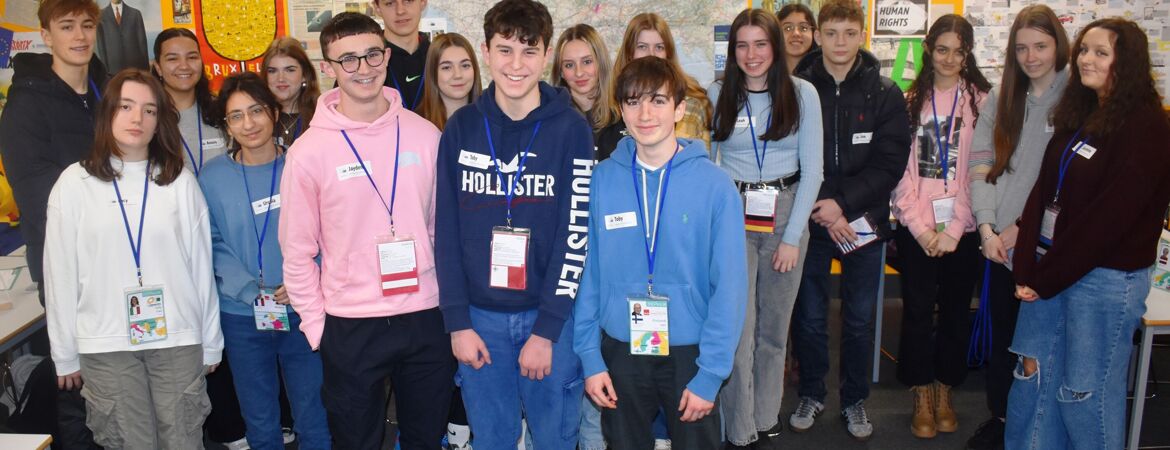College aims to become European Parliament Ambassador School
Back
Abbeygate Sixth Form College is on a mission to become a European Parliament Ambassador School, which would make it the only educational establishment in Suffolk to have that status.
They are currently going through this process by carrying out a number of projects with students on themes including international democracy, solidarity and multilingualism.
Most recently, representatives of the European Parliament from Europe House in London visited the college based on Western Way for an series of interactive workshops with students which gave them new insights into how the European Union (EU) functions and the shared values between the UK and the EU.
Jen O’Reilly-Turner is a language teacher at Abbeygate Sixth Form College and is the driving force behind the project. Jen said: “We are doing this to promote democracy, human rights and multilingualism. A-Level Language, Law and Politics students are involved.
“Our learners get a thorough understanding of how the EU Parliament works and get to learn about different political ideologies and cultures.
“It really important to recognise that despite the fact that we have left the EU, it’s still possible to work together and share the same values. Long term we will be working with One Sixth Form College and West Suffolk College to help them become ambassador schools too.”
“In terms of future activities, we will be hosting exchange visits from our partner schools in Belgium and Germany and in the spring will be visiting Barcelona. .
“We are also working with four other European schools on an EU sponsored project to collaboratively create a series of videos for young people on the topic of sustainable fashion. All of this has enormous benefit to the development of our learners whether they study languages, law or politics. Who knows – one day – one of them might go on and become an MEP.”
Alice Whelehan, 16, from Bury St Edmunds studies A levels at Abbeygate. Alice said: “I found out that the first president of Cyprus was an archbishop and if you shake your head to say no as you would in the UK, in Bulgaria this means yes. It’s great to have some involvement in this project.”
Alex Pascalides, 16, from Bury St Edmunds said: “We’ve learnt lots of facts about other countries and their political beliefs.
“I think it’s really interesting as I don’t know lots about the EU. I’m an EU citizen (I have a Polish passport through my mum) and it’s great to find out how it all fits together. Relationships with other countries are important as you can’t exist as a country on your own. I believe that working together is the best idea.”
In December, students at the college were also on of only two UK schools who were invited to participate virtually in a special session of the European Parliament in Strasbourg, France.
They followed live debates and got involved in discussions on how EU and UK partners can work together to ensure solidarity and the protection of human rights in the continent of Europe and also further afield.
They were able to put direct questions to the Head of the EU Parliament Human Rights Unit and also to the Speaker of the Parliament on the topics of how the EU and UK will be able to collaborate in the future to combat the rise and influence of the far-right and other extremist groups. They also discussed how the UK and the EU can ensure that even after Brexit, young people in the UK can continue to benefit from the legal protections of the EU.
Following the success of these workshops, staff and students have received an exclusive invitation to visit the European Parliament in Strasbourg later in the year to attend further parliamentary sessions and discuss with MEPs and other international law-makers issues of importance to young people.
Ed Boott works for Involver as a trainer and ran a series of workshops at Abbeygate as part of this project. Ed said: “We created some workshops to help explain how the EU functions and also helped explain some of the differences and similarities between other countries. Events like this are important to help inform young people and help them learn and understand more about the EU so that they can be more informed about this topic in the future.”





